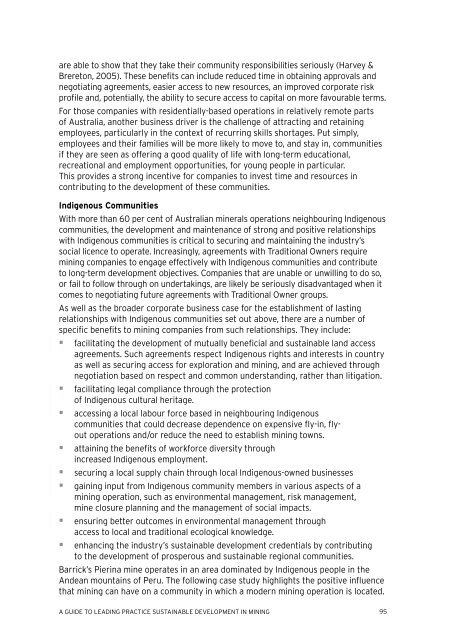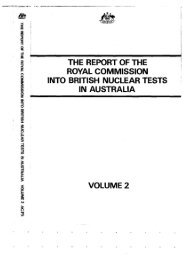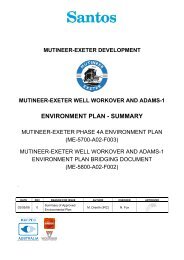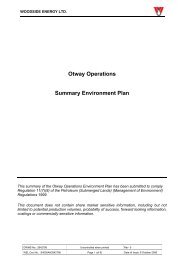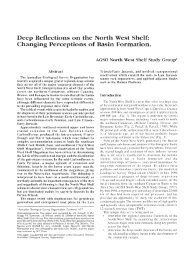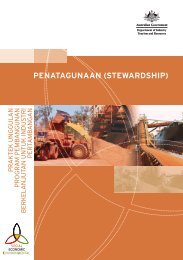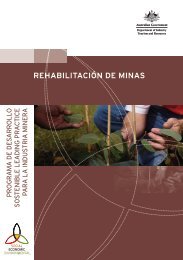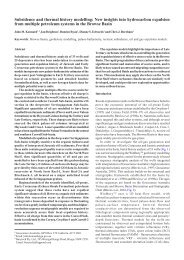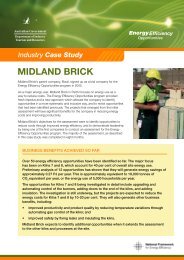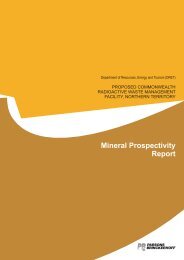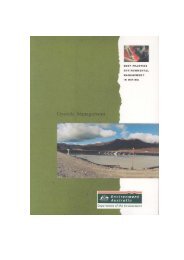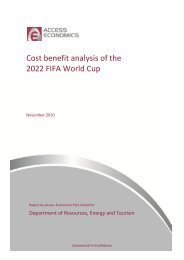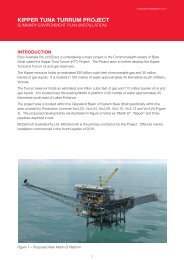A guide to leading practice sustainable development in mining
A guide to leading practice sustainable development in mining
A guide to leading practice sustainable development in mining
Create successful ePaper yourself
Turn your PDF publications into a flip-book with our unique Google optimized e-Paper software.
are able <strong>to</strong> show that they take their community responsibilities seriously (Harvey &<br />
Brere<strong>to</strong>n, 2005). These benefits can <strong>in</strong>clude reduced time <strong>in</strong> obta<strong>in</strong><strong>in</strong>g approvals and<br />
negotiat<strong>in</strong>g agreements, easier access <strong>to</strong> new resources, an improved corporate risk<br />
profile and, potentially, the ability <strong>to</strong> secure access <strong>to</strong> capital on more favourable terms.<br />
For those companies with residentially-based operations <strong>in</strong> relatively remote parts<br />
of Australia, another bus<strong>in</strong>ess driver is the challenge of attract<strong>in</strong>g and reta<strong>in</strong><strong>in</strong>g<br />
employees, particularly <strong>in</strong> the context of recurr<strong>in</strong>g skills shortages. Put simply,<br />
employees and their families will be more likely <strong>to</strong> move <strong>to</strong>, and stay <strong>in</strong>, communities<br />
if they are seen as offer<strong>in</strong>g a good quality of life with long-term educational,<br />
recreational and employment opportunities, for young people <strong>in</strong> particular.<br />
This provides a strong <strong>in</strong>centive for companies <strong>to</strong> <strong>in</strong>vest time and resources <strong>in</strong><br />
contribut<strong>in</strong>g <strong>to</strong> the <strong>development</strong> of these communities.<br />
Indigenous Communities<br />
With more than 60 per cent of Australian m<strong>in</strong>erals operations neighbour<strong>in</strong>g Indigenous<br />
communities, the <strong>development</strong> and ma<strong>in</strong>tenance of strong and positive relationships<br />
with Indigenous communities is critical <strong>to</strong> secur<strong>in</strong>g and ma<strong>in</strong>ta<strong>in</strong><strong>in</strong>g the <strong>in</strong>dustry’s<br />
social licence <strong>to</strong> operate. Increas<strong>in</strong>gly, agreements with Traditional Owners require<br />
m<strong>in</strong><strong>in</strong>g companies <strong>to</strong> engage effectively with Indigenous communities and contribute<br />
<strong>to</strong> long-term <strong>development</strong> objectives. Companies that are unable or unwill<strong>in</strong>g <strong>to</strong> do so,<br />
or fail <strong>to</strong> follow through on undertak<strong>in</strong>gs, are likely be seriously disadvantaged when it<br />
comes <strong>to</strong> negotiat<strong>in</strong>g future agreements with Traditional Owner groups.<br />
As well as the broader corporate bus<strong>in</strong>ess case for the establishment of last<strong>in</strong>g<br />
relationships with Indigenous communities set out above, there are a number of<br />
specific benefits <strong>to</strong> m<strong>in</strong><strong>in</strong>g companies from such relationships. They <strong>in</strong>clude:<br />
facilitat<strong>in</strong>g the <strong>development</strong> of mutually beneficial and <strong>susta<strong>in</strong>able</strong> land access<br />
agreements. Such agreements respect Indigenous rights and <strong>in</strong>terests <strong>in</strong> country<br />
as well as secur<strong>in</strong>g access for exploration and m<strong>in</strong><strong>in</strong>g, and are achieved through<br />
negotiation based on respect and common understand<strong>in</strong>g, rather than litigation.<br />
facilitat<strong>in</strong>g legal compliance through the protection<br />
of Indigenous cultural heritage.<br />
access<strong>in</strong>g a local labour force based <strong>in</strong> neighbour<strong>in</strong>g Indigenous<br />
communities that could decrease dependence on expensive fly-<strong>in</strong>, flyout<br />
operations and/or reduce the need <strong>to</strong> establish m<strong>in</strong><strong>in</strong>g <strong>to</strong>wns.<br />
atta<strong>in</strong><strong>in</strong>g the benefits of workforce diversity through<br />
<strong>in</strong>creased Indigenous employment.<br />
secur<strong>in</strong>g a local supply cha<strong>in</strong> through local Indigenous-owned bus<strong>in</strong>esses<br />
ga<strong>in</strong><strong>in</strong>g <strong>in</strong>put from Indigenous community members <strong>in</strong> various aspects of a<br />
m<strong>in</strong><strong>in</strong>g operation, such as environmental management, risk management,<br />
m<strong>in</strong>e closure plann<strong>in</strong>g and the management of social impacts.<br />
ensur<strong>in</strong>g better outcomes <strong>in</strong> environmental management through<br />
access <strong>to</strong> local and traditional ecological knowledge.<br />
enhanc<strong>in</strong>g the <strong>in</strong>dustry’s <strong>susta<strong>in</strong>able</strong> <strong>development</strong> credentials by contribut<strong>in</strong>g<br />
<strong>to</strong> the <strong>development</strong> of prosperous and <strong>susta<strong>in</strong>able</strong> regional communities.<br />
Barrick’s Pier<strong>in</strong>a m<strong>in</strong>e operates <strong>in</strong> an area dom<strong>in</strong>ated by Indigenous people <strong>in</strong> the<br />
Andean mounta<strong>in</strong>s of Peru. The follow<strong>in</strong>g case study highlights the positive <strong>in</strong>fluence<br />
that m<strong>in</strong><strong>in</strong>g can have on a community <strong>in</strong> which a modern m<strong>in</strong><strong>in</strong>g operation is located.<br />
A GUIDE TO LEADING PRACTICE SUSTAINABLE DEVELOPMENT IN MINING 95


